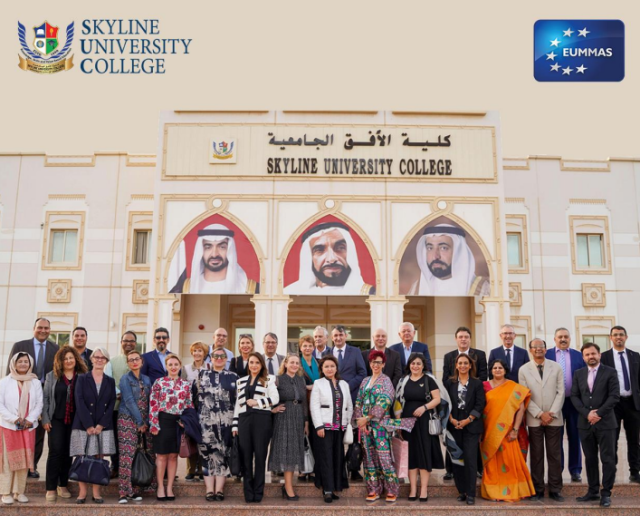THE ART OF DEVELOPING ENTREPRENEURIAL LEADERSHIP' - Ingredients for Social Entrepreneurial Leadership: Self-Mastery, Networks, Work Values and Competence
ACPSB Region 8 Conference Proceedings, pp.156-244
December 03, 2021
Across time, geographies, and industries, HR experts have discussed the endless issue of the best way to acquire, retain, engage, develop, and succeed talents, whilst most notably, achieving ROI on talent management activities. Millennials are increasingly covering a large part of the worldwide workforce, as well as, progressively focusing on selecting careers that provide meaning and purpose, based on a strong vision and direction; opting to join organizations that generate products and services positively impacting social concerns through innovation and entrepreneurial agility. Responding to the HR accountability on talent management, we propose organizations to alert to how social innovation and social impact are becoming meaningful purposes at work for many. To sustain organizational vitality through purpose, leadership, as well as, entrepreneurial mindset and skillset are crucial. Social entrepreneurial leadership is becoming a practical role deserving more attention in organizations of all sizes and governing statuses. The purpose of this paper is to discuss four key foundational ingredients for social entrepreneurial leaders to thrive: self-mastery, social networks, work values, and competence curricula.
See publication
Tags: Entrepreneurship
 Key Factors and Use Cases of Servant Leadership Driving Organizational Performance
Key Factors and Use Cases of Servant Leadership Driving Organizational Performance
IGI Global
December 03, 2021
Effective leadership is a major influence in the value creation for the success and sustainability required for organizations to thrive. Servant leaders or service-minded-behaving leaders, motivation, and interactions tend to promote exemplary performance and collaboration in organizations. This is a 21st-century must-have workplace-applicable style to develop cohesive high-performing teams, purposeful and engaging environments, and build trust and organizational vitality.
Key Factors and Use Cases of Servant Leadership Driving Organizational Performance provides findings and recommendations to support the practical application of servant leadership theory for the 21st-century economy. Moreover, the book seeks to share evidence of how servant or service mindset and behavior-oriented leaders might mitigate organizational existing conditions to promote team member empowerment through servant-like interactions, as a result influencing their performance. Covering topics such as empathetic leadership and employee satisfaction, it is ideal for executives, managers, researchers, practitioners, aspiring leaders, educational institutions/libraries, academicians, consulting firms, and students.
See publication
Tags: Change Management, Diversity and Inclusion, Leadership
Can Genuine Servant Leadership Gain Followers’ Respect for the Leader? Evidence from the Asian High-Power-Distance Cultures: A Multiple Case Study Approach
ProQuest
May 01, 2020
Servant leadership is a well-diffused philosophy shown in a plethora of research as a
favored model, as it explicitly defines that the leader's motivation is to serve first and lead
second, thus, putting the interest of others first before self. Yet, in cultures where codes of
structure in organizations embed deeper historical and traditional values, such as in Asia,
existing mainstream leadership styles like the paternalistic may present challenges for the
servant-driven philosophy of leadership to propagate empowerment of the followers.
See publication
Tags: Leadership, Culture
Winning Together: Outcomes of Pairing Servant and Inclusive Leadership Styles–Evidence of Organizational Practices
IGI Global
January 03, 2022
Organizational cultural dilemmas have shown the lack of psychological safety and sense of belonging, which may be positively impacted by the application of combined servant leader (SL) and inclusive leader (IL) behaviors. SL focuses on serving others’ needs first, embracing the individual's strength and stirring towards inclusiveness. Controversy exists in the literature regarding SL's ability to promote inclusiveness in the workplace. This chapter explores factors that link SL and IL from the angles of others-focused orientation and psychological safety, empowering uniqueness and a sense of belonging in followers. A framework of Inclusive Servant Leader (ISL) is explored. This study is significant as younger generations enter the workforce demanding more equitable leadership treatment, servant and inclusive behaviors have come to the forefront of organizational attention, nevertheless, its application is still in its infancy. A multiple case study research was conducted.
See publication
Tags: Leadership
Genuine Servant Leadership (GSL) Impacting Employee Motivation & Work-Intentions: A Special Focus on Asian High-Power-Distance & Vertical-Collectivist Organizations
IGI Global
January 03, 2022
Purpose – The purpose of this study is to explore the followers’ perspective of Genuine Servant Leadership (GSL) impact on them, and its direct relationship to work intentions, in Asian high-power distance and collectivist cultures.
Findings – The study found six follower manifestations when experiencing genuine servant leader behaviors from their leader, three towards the organization and three towards the leaders. Followers are more willing to: 1. voice-out ideas and concerns, 2. develop others, 3. recognize their choice in decision making (manifestation towards the organization). As followers respect their leader-follower relations, they tend to 4. voluntarily emulate their leader, 5. trust their leader, and 6. determine to follow their leader willingly (manifestation towards the leader). The six manifestations contribute to followers’ intent to perform, endorse, provide discretionary effort, stay and contribute to OCB.
Implications – Practical implications are offered in reflection of the future of work and skills required that HR and organizational designers are encouraged to consider and enable organizational growth.
Originality & Value – Despite the presence of a few studies on servant leadership linking employees’ outcomes and satisfaction, little is known about the link between servant leadership and employee work intentions, deemed to be more effective in predicting employees’ actions. This study contributes to filling an important gap in the scholarly work by looking at the followers’ perspective in high power distance and collectivist Asian cultures. The research sought to understand and analyzing-depth, the leader-follower interactions, and intricacies contributing to the manifestations of follower intentions.
See publication
Tags: Leadership, Future of Work
The Servant Leadership Movement: How Might Universal Leadership Behaviors Serve Millennials in Asia?
IGI Global
December 03, 2021
Servant Leadership explicitly states that the leader serves as a steward by focusing on the needs of the followers, developing them to increase in capabilities and autonomy, subsequently, strengthening the leader-follower relations. This chapter's purpose is to convey the applicability of this universal leadership model, illustrating how it would support culturally diverse case studies, as little has been focused on how to operationalize it for the younger generation. Research has already stated that servant leadership is beneficial to Millennials (Waddell & Patterson, 2018). Barbuto Jr. and Gottfredson (2016) mentioned the vital necessity to train Millennials in servant leadership behaviors.
See publication
Tags: Leadership
The Servant Leadership Movement: How Might Universal Leadership Behaviors Serve Millennials in Asia?
IGI Global
January 01, 2000
Uncommon to other well-known leadership models, servant leadership explicitly states that the leader serves as steward by focusing the needs of the follower, whilst growing the followers' autonomy. Consequentially, followers increase in capabilities and collaboration, strengthen the leader-follower relationships through partnership, generating decisions that can withstand challenges and sustain organizational success. The purpose of this chapter is to convey the applicability of this universal leadership model, illustrating how it would support culturally diverse case studies. Research has already stated that servant leadership is beneficial to Millennials. Little literature has focused on how to operationalize it for the younger generation. Barbuto Jr. and Gottfredson mentioned the vital necessity to train Millennials in servant leadership behaviors. This chapter highlights how servant leadership might be applied based on Van Dierendonck's and Van Dierendonck and Nuijten's research on Millennials in Asia.
See publication
Tags: Leadership
Rethinking Human Resources for Social Innovation in Business: Trends – Leadership – Action Plan
Amity Global Business Review, Vol. 12
February 01, 2017
Engagement and talent management issues have been surrounding upon the best method to invest on human capital with the maximum of ROI. Research confirms that the Millennial generation overtaking the workforce is more and more seeking for meaningful work. We propose that one way is to pay attention on how social innovation and social impact are becoming that meaningful purpose at work for employees. To sustain organizational vitality through purpose, leadership is needed and this paper explores just these topics by finally providing an action plan, in the form of thought-process, in support of HR building an HPS (High Potential System) through rethinking its purpose linked to the purpose of the organization’s existence.
See publication
Tags: Leadership, Innovation, HR
The Business Case for Education to Include Soft Skills on the Systemic Level: Reflection on Being A Culturally Responsive Educator In Higher Education
Amity Global HRM Review Volume-6,ISSN NO 2250-60
January 01, 2017
The topic of culturally responsive education is well researched. Much has been focused on the topic of pedagogy, methodology and class-room operations. Nevertheless, this topic seems to be mostly researched under the single area of providing education, without having looked at the impact of the economic value and consequences of providing a more culturally responsive education on students after their studies and in their work lives. In addition, students of more mature age already with careers, concurrently fulfilling their higher education would have appreciation for a similar type of teaching method discussed herewith.
This paper will provide context and a business case that explains the bridge of furnishing a culturally responsive education through soft-skills, as a parameter of success for educators, students, and the institution-provider on the systemic level, while explaining the well-being state of using soft skills for all groups, as well as, identifying which skills used have the highest financial benefit for the organization.
See publication
Tags: Leadership, Education
Universal Leadership Approaches & Cultural Dimensions the Expression of Asian Leadership Traits
Amity Global Business Review Vol. 10, Amity University Press
February 01, 2015
To what extent do universal leadership concepts need to be adapted to countries of dissimilar cultural dimensions, presumably with dissimilar expectations and needs? One way is to find out what common antecedents and outcomes of behaviors are appreciated by organizations and individuals. Several studies on US based universal leadership concepts have been tested on their applicability in Asian organizations (Singer et al, 2001; Linden, 2011; Lam et al, 2012). Local Chinese leadership traits have been researched in the attempt to ascertain that a big portion of the ethnic Asian culture made up of Chinese heritage comprises more complex and deepen traits, unlike many of the Western management traits (Min et al, 2012; Liu, 2013), suggesting certain universal leadership models stemming from the USA may adapt better in certain countries than others in different scenarios (Ramkissoon). Reilly & Karounos further explored leadership effectiveness, basing in Hofstede’s cultural dimensions to compare and contrast tri-regional clustered groupings of traits in association to behaviors and Emotional Intelligence. The literature review herewith is non-exhaustive. This paper concentrates on 4 areas in reaching an exploratory articulation of how some of the literature in cultural dimensions, leadership models and emotional intelligence (EI), can relate to the case study presented herewith, based on a real M&A consulting case of two foreign corporate subsidiaries merging in Asia.
See publication
Tags: Leadership, Mergers and Acquisitions
 Servant Leadership in Asian High-Power Distance Cultures: A Literature Review and Framework
Servant Leadership in Asian High-Power Distance Cultures: A Literature Review and Framework
Proceedings – EUMMAS A2S
October 20, 2023
In cultures where organizational codes of structure embed deeper historical and traditional values,
specifically in Asia, existing mainstream leadership styles like the paternalistic one may present challenges
for the servant-driven philosophy of leadership to propagate the empowerment of followers. Thus, whether
followers respect a servant leader in high power-centric cultures still represents a literature gap. This paper
presents an exploratory review of the interplaying factors influencing respect for leaders, where servant
leadership and authoritarian style within paternalism meld, in Asian high-power distance cultures, as part
of a larger study aimed at determining how leaders may better understand the process of gaining followers’
respect. The servant leadership diffusion in Asia and critique, continued by a deeper understanding of the
Asian followers, their relationship to authority, and the influence of cultural expectations are illustrated, as
the basis to build a case for servant leadership theory in Asia, toward a focus area for future research.
The authors conducted a review of seminal and current theories of a servant, respectful, and authoritarian
leadership styles, power, as well as followership literature, with a specific focus on followers’ respect for
the leader in Asian high-power distance cultures. The initial criteria for inclusion involved a sample indexed
in databases of EBSCO, ProQuest, and Google Scholar. Key search term of servant leadership was used in
the title, abstract, or keywords, written in English. A total of 111 articles were found relevant, of which 8
were excluded. The final research corpus was comprised of 103 papers published between 2001 to 2023.
To the best of the authors’ knowledge, this is one of the first literature reviews to have a specific focus on
followers’ respect for the servant leader in Asian high-power distance cultures.
See publication
Tags: Management, Leadership, HR


 Key Factors and Use Cases of Servant Leadership Driving Organizational Performance
Key Factors and Use Cases of Servant Leadership Driving Organizational Performance
 Servant Leadership in Asian High-Power Distance Cultures: A Literature Review and Framework
Servant Leadership in Asian High-Power Distance Cultures: A Literature Review and Framework